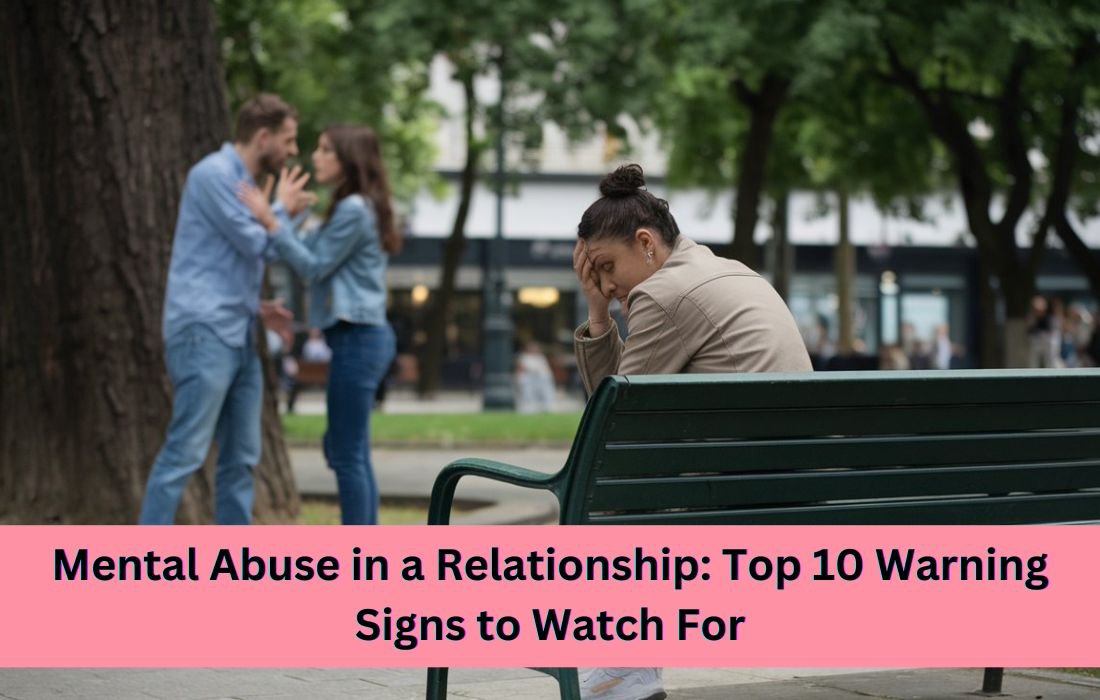
Mental Abuse in a relationship is as important as physical abuse.
If you think abuse is only physical, think again—there are many forms of abuse that require your voice to stand up against them.
Whenever we mention the word “abuse,” it sets a mental picture of hitting someone else physically with hands.
However, abusive relationship isn’t always physical. There are so many forms like mental abuse, financial abuse, and cultural abuse.
Everyone deserves to feel safe, loved, and respected in any relationship.
Once you understand the signs of mental abuse, you are prepared to protect yourself and others.
Let’s get started and to understand it better stick to me till the end of the blog post.
What is mental abuse in a relationship?
Sometimes a person might hurt others in ways that cannot be seen, like they manipulate your feelings by their harsh words. This is called mental or emotional abuse in a relationship.

Mental abuse make you feel worthless.
Your partner constantly criticizes you and tries to control you. This form of abuse doesn’t leave bruises, but it certainly leaves a deep wound in the heart.
Common warning signs of mental abuse
Mental abuse leaves no marks on the body, but it hurts you from inside.
Stay updated on the warning signs of mental abuse in a relationship so you can spot it early and seek help immediately.
Here are some warning signs to spot for:
1. Constant need for updates
A major sign of mental abuse is when your partner constantly needs to know where you are and what you’re doing.

They will constantly say things like, “Where are you? What are you doing? Who’s with you?” all the time.
Such behavior is meant to control you and make you feel anxious or guilty if you’re not quick to respond.
For example, your partner constantly goes through your phone, asks you about conversations on the go, or gets angry for every moment when you don’t reply to texts or calls on time.
2. Sarcastic jokes
Sarcasm is like saying something funny to your face, but on the inside, they are hurting your feelings.
They can call themselves funny and just making a joke, but it does hurt people’s feelings, especially if they do it all the time.

Sometimes it seems as though a small joke at first. But eventually, after some time, you begin feeling less confident.
For example: Your partner calls you lazy because you forgot to do a chore, laughs at your job or jokes about something you love in front of others.
3. Controlling behavior
Controlling behavior is when someone wants to dictate every little thing you do.
They would tell you what to wear, who to go with, and basically anything they fancy.

You become dependent and start to believe you can’t even decide on anything in your life. It further makes you feeble and as though you are stuck in a situation.
Example: Your partner is always complaining about your dress being inappropriate. They always ask you what you are doing.
4. Hot and cold behavior
In abusive relationships, the mean person sometimes acts nice and other times acts cold or angry.
They might say nice things to you and give hugs one minute. Then, they might ignore you or be upset the next minute.

This behavior is often referred to as “hot and cold.” It confuses, frightens, and leaves the person feeling unsure of what may happen next.
The person would always be walking on eggshells, feeling nervous.
5. Love bombing
Love bombing is when he bombards you with tons of love, gifts, and flattery at the start of a relationship.
You start to feel very special and super happy.
However, after that, you’d really start caring for them; they will eventually get cold on you and stop being so nice.

Sometimes, they do it because they want to control you. They want you to feel bad if you don’t do what they want.
Initially, the partner showers you with hugs, gives you gifts, and compliments you “amazing.”
But then, when you don’t do something that she or he likes, then they turn around and call you names and make you feel bad.
6. Feeling like everything is your fault
In mental abuse, the person who hurt the other makes that person feel bad about all the things.
They blame you for things not your fault.

That’s why such a person feels sad, guilty, and not good about themselves, in the long run.
They start relying on the person who hurts them.
Example: If you commit a mistake, the other person might start blaming you and asserting that all fault is yours.
7. Gaslighting
Gaslighting is a form of psychological abuse that attempts to make you question truth you are certain about.
They would tell you things occurred in a manner in which you know they didn’t.

It may confuse you and even make you doubt your own mind. Eventually, you become doubtful of everything.
Example: Your partner says something mean but when you remind them of it, they say, “You’re overreacting,” though you remember vividly.
8. Disrespect for your opinions
In a mentally abusive relationship, the other person doesn’t listen to your ideas. They may just ignore what you say as well as laugh at how you feel.
In a healthy relationship, people respect other’s thoughts, even if they are not agreeing with them.

But in an abusive relationship, your thoughts do not matter to them, which really makes you feel sad.
Example: If you express an opinion, the person can interrupt you, raise his eyebrows.
9. Defensiveness and anger
Your partner gets just very angry when you talk to them concerning their bad behavior.
They will blame you and make you feel that it is your fault.

They may even start referring to you with abusive names and comment that you are just too sensitive.
In this case, you fear that if you share your feelings with them, they would laugh at you.
Example: You frustrated him over something, and instead of trying to clear it out. He got angry and called you some insults.
10. Indifference to your interests
They don’t care about anything that you like to do, or what you enjoy.
Over time, they can mock the things that are important to you and challenge those.

You might forget what makes you happy or who you are.
It could be like nothing you care about matters.
Example: So, when you tell your partner about something you love, they do not listen or make you feel like it is not a big deal.
Conclusion
Mental abuse happens when someone hurts your feelings.
There is no damage to your body, but it takes away from your heart and mind.
Knowing how to spot mental abuse in a relationship might be the first step to improving and protecting yourself.
It scares to speak or even leave when emotions are involved.
However, staying in a hurtful relationship may mean the worst for you.
Let us look at what we have learned from this blog
Key takeaways on mental abuse in relationships:
- Constant need for updates: They always ask where you are and what you are doing. It makes you a prisoner.
- Mean jokes: They make jokes that hurt your feelings and say, “I’m just joking,” but it still feels bad.
- Controls you: They tell you what to wear, whom to talk to, or what to do, as if you can’t decide for yourself.
- Changing moods: One moment they are super nice, then the next they’re angry or mean, and you don’t know why.
- Too much love at first: They give you too much attention as if you were the best person in the world, then stop being soft and use your feelings against you.
- Blame games with everything: Claim everything is happening because of you when things are going wrong, though you know it isn’t.
- Making you question yourself: They tell you things did not occur the way you know they happened, and you would be confused about what was really real.
- Not listening to you: They’re not interested in your thoughts and laugh at your ideas.
- Getting angry with you quickly: Any time you try to express what you feel, they get mad or start accusing you instead of listening.
- Indifference to your interest: He doesn’t care for anything that you like and dislikes.
These are signs of mental abuse in a relationship that will help you protect yourself from further harm.
“Was this helpful”? Share with your friends!”



